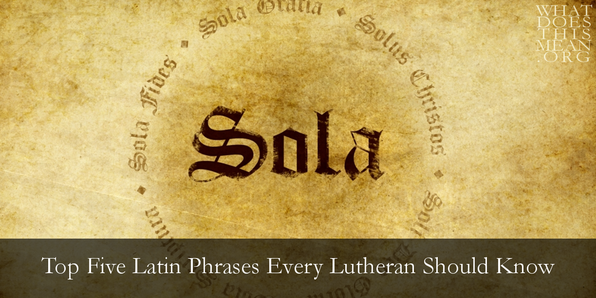Right off the bat I am sort of cheating. Sola means “alone” or “only.” Yet, Sola is never alone! In lovely Lutheran lingo, there are five Solas: sola gratia (grace alone); sola fide (faith alone); solo Christo (Christ alone); sola scriptura (Scripture alone); sola deo Gloria (glory to God alone). The formula in English usually reads something like this: We are justified (declared right before God) by grace ALONE through faith ALONE on account of Christ’s work ALONE. When it comes to where the authority in the church is found, we confess it is found in the Scriptures ALONE as our sole norm of faith and life. All of this maintains that God ALONE is glorified in his work.
Now, the solas are crucial if we are to understand what distinguishes Lutherans from every other Christian denomination; why our church, you might say, stands ALONE (get it?). For example, the Roman Catholic church will maintain that they believe one is justified by grace through faith. Of course! Just not grace alone through faith alone. Rather, one is justified when the grace that empowers one to exercise faith becomes active in love. Notice how this phrase leaves room for our work in justification. Faith active in love justifies, not faith despairing of my love and trusting in Jesus ALONE. (Notice here how Jesus does not get all the glory in justification, but our loving faith gets some credit. No more sola deo gloria).
Or consider sola scriptura. Now this one might get me in trouble with our evangelical friends. The Lutherans are the only church that actually follows this one all the way through. Our closest cousins in the Reformation, the Calvinists, will fight you to your face, with their angry reformed fists in the air, if you suggest they are not a sola scriptura church. “Of course we think that the Word alone norms our faith and life.” But, consider the sacraments. As soon as you ask them if the bread at the Lord’s Supper really is Jesus’ physical body, like the Jesus plainly says, they respond with that other norm: reason. “Well, how could he be in heaven and in your mouth and the mouth of your neighbor?” I dunno. But, that is what the Scriptures say. So, leave them ALONE!
I could go on and on. Suffice it to say that these solas keep our eyes fixed on Jesus alone for everything. As soon as we start to add something of our works to justification by grace through faith on account of Christ, we have ignored the plain teaching of scripture and undermined the glory of God.
#4: incurvatus in se
OK, this explanation won’t be as long as the last one. This and the next phrase on the list belong together, I think, if we are to understand the nature of our sin and the nature of God’s salvation. Incurvatus in se means to be turned in on yourself or curved inwards. This is how Luther would define sin. I suppose we might say that this is Latin for belly-gazing. We are so fixated on our own beautiful bellies that we don’t look to God in faith or to our neighbor in love. We trust our bellies and love their fuzzy lint! Honestly, when has your belly ever led you astray? But, of course, our hearts and bellies are full of nothing but cholesterol and lint. So that, turning inwards is the lifestyle of the sinner. There is no fear, love, or trust of God and there is no love towards the neighbor when we are curved in on ourselves.
#3: extra nos
Thus, we ought never look inside for salvation. The only things that comes from within there, Jesus says, are “evil thoughts, sexual immorality, theft murder, adultery, coveting, wickedness, deceit, sensuality, envy, slander, pride, foolishness.” (Mark 7:21-22). These things leave us dead when our faces are pulled away from our hairy bellies towards the awful glory of God. Thus, salvation must come from outside of us, or, to use the Latin, salvation must come extra nos. Any hope of standing before God must come from somewhere else to us.
It is kind of like that scene in Lord of the Rings when the Ring of Power is finally cast into the mountain and destroyed. All of middle earth is in the thralls of war and battle. It looks like there is no hope for those fighting against evil until the ring is destroyed. Once the ring is gone, suddenly the whole world, by no effort of its own, is set free from bondage. Someone else saved them, namely Frodo and Sam. The work that Frodo and Sam did for them apart from them was their saving grace.
Someone else, somewhere else, outside of me has to be my savior because, right here and right now in this place, I am too sinful and too embattled to do anything for my salvation. Christ comes outside of me, in His own flesh to die in my place and rise for my justification. His particular death on a particular Friday and His particular resurrection on a particular Sunday roughly 2000 years ago are my only hope and salvation. And, though these are outside of my doing, I know they are mine, because a baptism that happened to me, not from me, gave them to me. God in Christ by the power of the Holy Spirit accomplished all of this without any worthiness or merit in my gross belly. He comes to me even now, from the outside, in bread and wine to give me His body and blood for my free forgiveness. His Word comes from without as it is preached into my ears and heart. It is all His work, done outside of me, but done for me!
#2: simil iustus et peccator
This one is huge! It means that we are simultaneously justified/declared righteous and sinful. Or, to put it another way, we are simultaneously sinners and saints. I saw a woman with a T-shirt the other day that looked like a shirt someone would wear in prison. On the front it said “saint” and on the back it said “sinner.” I said, “I like that shirt! Where did you get it?” I expected her to refer to some church function or maybe even Old Lutheran.com. “I got it at Kohl’s.” Weird. Anyhow, she went on, “We are all kind of a dichotomy like that I guess.” Then she chased after her granddaughter and avoided talking to me anymore. So much for evangelism at the kid’s school. But I digress.
My fashionable almost-friend expressed a common misunderstanding with the simul (by the way, if you want to sound like the Lutheran “in” crowd, just refer to this phrase as “the simul”). This phrase is not saying that we are a dichotomy, that sometimes we act like sinners and other times we act like saints, like Dr. Jekyl and Mr. Hyde. Nor does it mean that we are partially sinners and then partially saints. We don’t think of this phrase in moral terms, that is, sometimes I am a good person and sometimes I am a bad person since I am a mix of both. What we mean is that the baptized child of God is 100% sinner and 100% saint at the exact same time (good Lutheran theologians are bad mathematicians). You and I will daily have to fight against the old sinful nature. The old Adam was drowned in baptism, but that sucker can swim, as Luther once quipped. The old, sinful nature must be drowned daily as we remember our baptism in repentance.
But, you are not only a sinner. By virture of your baptism, you are a saint! Why? Because God said so. He put His name on you, crucified you with His Son, raised you to a new life, clothed you in Christ’s righteousness, and washed you clean. According to the Word of God, the promise of baptism, you are a saint! You may not ever see it in your own actions. You may only see the activity of the sinner. But, Christ shed His blood for you so that you might be his own. To bring this thing full circle: we are always at the same time incurvatus in se and justified extra nos. (Hey, look dude! You know some latin!) The sinner is found on earth in me, and the saint is found in Christ in heaven.
#1: Verbum Domini Manet in Aeternum
I saved this one for last simply because it is stinking long! It means “the Word of the Lord endures forever.” Not only would this make a completely sweet tatoo, it is really the battle cry of the Lutheran Reformation. It was the symbol of the Smalcaldic League (a leauge of sixteenth century Lutheran princes organized to defend their lands against those who would seek to overthrow the preaching of the Gospel). They put it on their flags, weapons, uniforms, and Wheaties boxes. When the whole world seems to be opposed to the preaching of God’s Word, we are reminded with this phrase that the world in its sin and despising of God is temporary, but God’s Word is eternal. 1 Peter 1:24-25 says, “For ‘all men are like grass, and all their glory is like the flowers of the field; the grass withers and the flowers fall, but the Word of the Lord stands forever.’” And this is the word that was preached to you.”
This Word that endures forever that is preached into our ears and hearts is the Word of the cross. That blood-soaked Word is the Word of Jesus which cries out “I forgive you!” against the devil, the world, and our flesh. Suffering and persecution, temptation and despair, sickness and death will come our way if we are in Christ. But nothing can separate us from the love of God that has been enfleshed and verbalized to us in Jesus Christ. His Word of mercy and forgiveness is for you, forever. Kind of like a tattoo…a completely sweet tattoo!
So, there is the list! I know, I know, there are so many I left out! Here are a few of the bubble phrases: Lex semper accusat (“the law always accuses,” enough said); ex opere operato (“from the work done,” not a phrase we like, it is the teaching that sacraments work without faith found in Rome. You just need to know it if you read the Apology to the Augsburg Confession); ex nihilo (“out of nothing,” God creates out of nothing). I am sure there are more. So, bring it on! “Top Five Latin Phrases Every Lutheran Should Know!” What others can you think of?



 RSS Feed
RSS Feed
